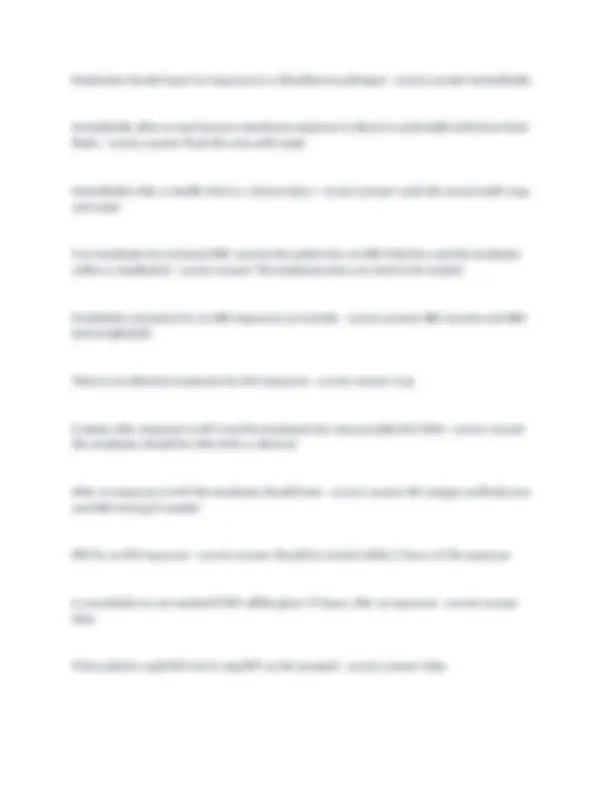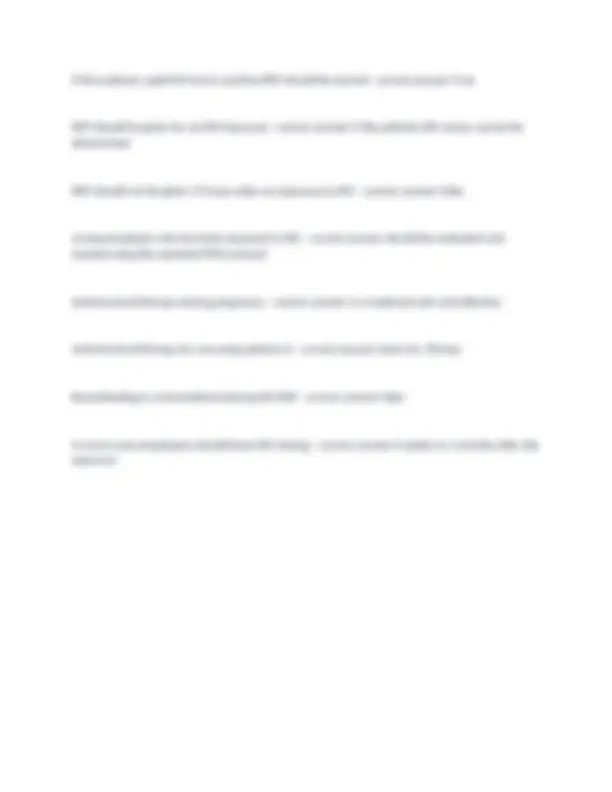




Study with the several resources on Docsity

Earn points by helping other students or get them with a premium plan


Prepare for your exams
Study with the several resources on Docsity

Earn points to download
Earn points by helping other students or get them with a premium plan
Community
Ask the community for help and clear up your study doubts
Discover the best universities in your country according to Docsity users
Free resources
Download our free guides on studying techniques, anxiety management strategies, and thesis advice from Docsity tutors
CEUFAST OSHA Occupational Exposure to Bloodborne Pathogens quiz with complete solutions All body fluids except sweat should be considered potentially infectious - correct answer True Needlestick injuries are very common - correct answer True Transmission of a bloodborne pathogen after an occupational exposure is very common - correct answer false Exposure to a bloodborne pathogen is defined in part as? - correct answer Contact of a mucous membrane/non-intact skin with a potentially infectious body fluid or secretion
Typology: Exams
1 / 4

This page cannot be seen from the preview
Don't miss anything!



All body fluids except sweat should be considered potentially infectious - correct answer True Needlestick injuries are very common - correct answer True Transmission of a bloodborne pathogen after an occupational exposure is very common - correct answer false Exposure to a bloodborne pathogen is defined in part as? - correct answer Contact of a mucous membrane/non-intact skin with a potentially infectious body fluid or secretion The risk of developing an HBV infection after an occupational exposure - correct answer Is relatively common The risk of developing an HCV infection after an occupational exposure - correct answer Is very uncommon The risk of developing an HIV infection after an occupational exposure - correct answer Is rare The risk of transmission of a bloodborne pathogen depends in part on - correct answer The viral load of the patient and the type of injury/exposure Employers must offer HBV vaccination to their employees - correct answer true Standard precautions include - correct answer Hand hygiene, PPE safe injection practices, and respiratory hygiene/cough etiqutte
Alcohol based hand sanitizers are less effective than soap and water - correct answer False soap and water should be used for handwashing - correct answer when the hands are visibly soiled Hand hygiene should be done - correct answer before and after providing patient care The choice of which PPE to use is based on - correct answer The risk of exposure the specific care situation PPE should be donned and removed in a specific sequence - correct answer True Handwashing is the most effective way of preventing the transmission of pathogens - correct answer True If an employee wears gloves handwashing is not necessary - correct answer false IV catheters needles and syringes should never be re used for another patient - correct answer true Contaminated needles and sharps should not be re capped - correct answer true The def of an exposure to a bloodborne pathogen is in part of - correct answer Contact of the eyes mouth or non intact skin with blood An exposure to a bloodborne pathogen can cause significant emotional harm - correct answer True
If the patients rapid HIV test is positive PEP should be started - correct answer True PEP should be given for an HIV exposure - correct answer If the patients HIV status cannot be determined PEP should not be given 72 hours after an exposure to HIV - correct answer False A preg employee who has been exposed to HIV - correct answer should be evaluated and treated using the standard PEP protocol Antiretroviral therapy during pregnancy - correct answer Is considered safe and effective Antiretroviral therapy for non-preg patients is - correct answer Given for 28 days Breastfeeding is contraindicted during HIV PEP - correct answer false In most cases employees should have HIV testing - correct answer 6 weeks to 3 months after the exposure